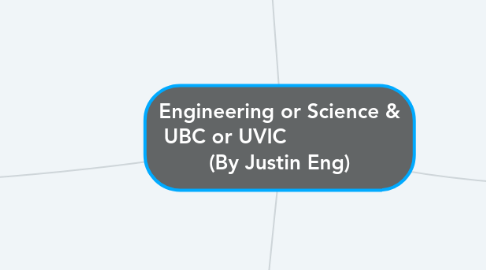
1. Engineering
1.1. Pros
1.1.1. If I were to graduate, I would have a better opportunity of getting higher level jobs
1.1.2. I enjoy exploring and learning about how the world works and how I can predict it
1.2. Cons
1.2.1. Work load
1.2.1.1. I am concerned that the work load will be too massive
1.2.1.1.1. Roughly 40% of first year engineers drop out and 60% of the starting engineers will eventually change majors
1.2.2. Cost
1.2.2.1. The initial cost for engineering students is significantly higher than a Science student
1.2.3. The job opportunites in engineering are most likely outside BC, so I would have to move away
1.3. Branches
1.3.1. UVIC
1.3.1.1. Biomedical engineering
1.3.1.2. Computer Science engineering
1.3.1.3. Software engineering
1.3.1.4. Electrical engineering
1.3.1.5. Mechanical engineering
1.3.1.6. Civil engineering
1.3.2. UBC
1.3.2.1. Biomedical engineering
1.3.2.2. Computer Science engineering
1.3.2.3. Software engineering
1.3.2.4. Electrical engineering
1.3.2.5. Mechanical engineering
1.3.2.6. Civil engineering
1.3.2.7. Mining engineering
1.3.2.8. Materials engineering
1.3.2.9. Geological engineering
1.3.2.10. Environmental engineering
1.3.2.11. Integrated engineering
2. UBC
2.1. Benefits
2.1.1. Larger Campus
2.1.1.1. More people to meet and become friends with
2.1.2. Larger City
2.1.2.1. More options during leisure
2.2. Compromises
2.2.1. Slightly more difficult to commute around, so I will most likely use the sky train
2.2.2. Since Vancouver is such a large city, it will have much more traffic
2.3. Cost
2.3.1. Tuition
2.3.1.1. The cost for a year in Sciences would be $7509 which includes textbooks and student fees
2.3.1.2. The cost for a year in Engineering would be $10683 which also includes textbooks and student fees
2.3.2. Transportation
2.3.2.1. I would likely buy a compass card which would allow me to use the sky train
2.3.3. Housing
2.3.3.1. Residence
2.3.3.1.1. It would roughly cost $10709 for a whole year. This would include the meal plan
2.3.3.2. Family
2.3.3.2.1. The cost would vary if I were to live with my extended family
2.3.4. Food
2.3.4.1. The UBC website gave an estimate of $3000 for food and groceries
2.3.5. The total cost for UBC would be around $25000-$29000
3. UVIC
3.1. Compromises
3.1.1. I won't get to explore and live in a new city
3.1.2. Smaller campus: Less options
3.2. Benefits
3.2.1. Since it is much smaller, I can travel around campus by just walking
3.2.2. It is closer to home
3.3. Cost
3.3.1. Tuition
3.3.1.1. The cost for a year as a science undergraduate would cost around $6250. This does not include housing, food, or textbooks
3.3.1.2. As an engineering undergraduate, a year would cost $7582. This does not include housing, food, or textbooks
3.3.2. Transportation
3.3.2.1. An annual bus pass would be $162
3.3.3. Housing
3.3.3.1. I could live at home or residence
3.3.3.1.1. Residence for a "Cluster Room" would be $6182
3.3.3.2. I could live at home
3.3.4. Food
3.3.4.1. If I were to sign up for the Meal Plan. it would cost $2214
3.3.5. The total cost for UVIC would roughly be around $23000-$26000
4. Sciences
4.1. Pros
4.1.1. I can learn more about the Theories rather than the Laws of how things work and interact
4.1.2. Work load
4.1.2.1. Less work intensive than Engineering, but still intense
4.2. Cons
4.2.1. Some fields are less likely to have jobs in BC, so if I were to continue on as an astronomer I would likely move somewhere that had better opportunities
4.3. Branches
4.3.1. UVIC
4.3.1.1. Biology
4.3.1.1.1. Physiology
4.3.1.1.2. Neuralbiology
4.3.1.1.3. Cellular and Molecular Biology
4.3.1.2. Biochemistry & Microbiology
4.3.1.2.1. Human Anatomy
4.3.1.2.2. Cell Biology
4.3.1.2.3. Animal Biology
4.3.1.3. Chemistry
4.3.1.3.1. Physical Chemistry
4.3.1.3.2. Analytic Chemistry
4.3.1.3.3. Organic Chemistry
4.3.1.3.4. Inorganic Chemistry
4.3.1.4. Earth & Ocean Sciences
4.3.1.5. Mathematics and Statistics
4.3.1.6. Physics and Astronomy
4.3.2. UBC
4.3.2.1. Biology
4.3.2.1.1. Behavioural Neuralscience
4.3.2.1.2. Biophysics
4.3.2.2. Biochemistry & Microbiology
4.3.2.2.1. Microbiology and Immunology
4.3.2.2.2. Cellular, Anatomical and Physiological Sciences
4.3.2.3. Chemistry
4.3.2.3.1. Computer Science and Chemistry
4.3.2.3.2. Biochemistry and Chemistry
4.3.2.3.3. Chemistry Biology
4.3.2.3.4. Oceanography and Chemistry
4.3.2.4. Earth & Ocean Sciences
4.3.2.4.1. Atmospheric Science
4.3.2.4.2. Geophysics
4.3.2.4.3. Environmental Sciences
4.3.2.5. Mathematics and Statistics
4.3.2.6. Physics and Astronomy
4.3.2.7. Pharmacology

